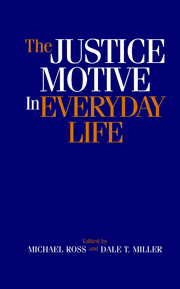Book contents
- Frontmatter
- Contents
- List of Contributors
- Introduction
- 1 Overview of the Volume
- 2 Pursuing the Justice Motive
- Theoretical Perspectives on the Justice Motive
- Victim Derogation and the Belief in a Just World
- The Justice Motive and Prosocial Behavior
- Justice-Based Reactions to Transgressors
- Justice and Reaction to One's Own Fate
- Name Index
- Subject Index
2 - Pursuing the Justice Motive
Published online by Cambridge University Press: 08 September 2009
- Frontmatter
- Contents
- List of Contributors
- Introduction
- 1 Overview of the Volume
- 2 Pursuing the Justice Motive
- Theoretical Perspectives on the Justice Motive
- Victim Derogation and the Belief in a Just World
- The Justice Motive and Prosocial Behavior
- Justice-Based Reactions to Transgressors
- Justice and Reaction to One's Own Fate
- Name Index
- Subject Index
Summary
I have spent the greater part of my life as a psychologist trying to understand why people care about justice. Where does the justice motive come from, and how does it appear in people's lives during the normal course of events as well as during critical periods? From the outset I thought these were the most fascinating, important questions one could imagine. And I was convinced that the commonly available answers, based on the internalization and implementation of the “social contract,” were, at best, only partially true, and if taken as the complete gospel terribly misleading. It seemed obvious to me that people learn many social rules and that societies have numerous norms and regulations, but that the ones associated with justice have a special status at both the individual and societal levels. It is easy enough to demonstrate, as ethno-methodologists have, that people walk around with an acute, but often tacit, sensitivity to their own and other's entitlements – what they deserve, what they are entitled to from x or y. The relative deprivation literature suggests that no amount of “desired resources” can bring satisfaction to people who believe they deserve more, and that no amount of deprivation can lead to outrage and resentment if people believe they are entitled to no more than they have. At the macro-level of analysis, at least in Western societies, justice has a special status superseding all other norms and values.
- Type
- Chapter
- Information
- The Justice Motive in Everyday Life , pp. 10 - 38Publisher: Cambridge University PressPrint publication year: 2002
- 18
- Cited by



